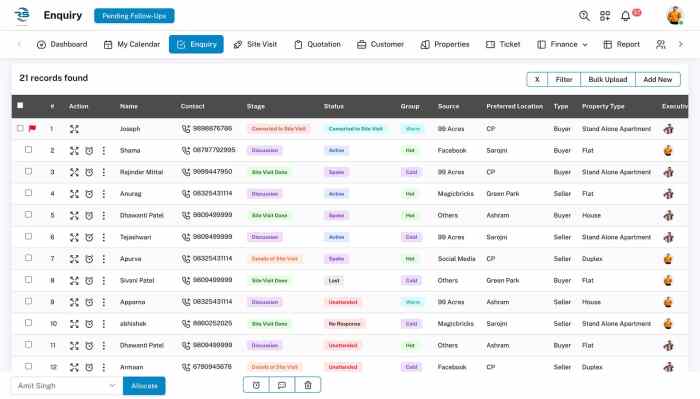Best CRM for real estate developers is crucial for streamlined operations and maximizing profitability. This guide dives deep into the landscape of CRM solutions, exploring features, benefits, and practical considerations for developers looking to elevate their business processes. From lead management to client communication, we’ll explore the top contenders and help you find the perfect fit.
Choosing the right CRM is a critical decision for real estate developers. Factors like team size, budget, and specific needs should be considered. This comprehensive guide provides insights to help navigate the options and select the CRM that best aligns with your business goals.
Real estate development is a complex business, requiring meticulous management of projects, clients, and sales. A robust Customer Relationship Management (CRM) system can significantly streamline these processes, fostering better communication, increased efficiency, and ultimately, higher profitability. This guide dives deep into the world of real estate CRMs, helping developers choose the right platform to suit their specific needs.
Understanding the Needs of Real Estate Developers
Real estate development companies face unique challenges that a generic CRM might not address. They need a system capable of handling multiple projects simultaneously, managing diverse client interactions, and tracking complex sales processes. Key features for a real estate developer’s CRM include:
- Project Management Integration: The CRM should seamlessly integrate with project management tools, allowing developers to track progress, deadlines, and budget allocations.
- Lead Management & Qualification: Effective lead capture and qualification are crucial. A good CRM should help categorize leads, assign them to relevant teams, and track their engagement.
- Sales Pipeline Management: Visualizing and managing the sales pipeline is essential. The CRM should allow for accurate forecasting and identifying potential bottlenecks.
- Client Relationship Tracking: A robust system for managing client interactions, communication history, and preferences is vital for building lasting relationships.
- Customizable Reporting & Analytics: Developers need data-driven insights into their operations. Customizable reports and dashboards are essential for monitoring performance and identifying areas for improvement.
- Integration with Other Tools: Modern real estate development often involves multiple software tools. The CRM should integrate with existing tools for accounting, marketing automation, and other essential platforms.
Top CRM Platforms for Real Estate Developers
Several CRM platforms cater to the specific needs of real estate developers. Here are a few popular options, along with their strengths and weaknesses:
Salesforce
Salesforce is a powerful, versatile CRM platform that can be customized to fit a wide range of business needs. It offers robust features for lead management, sales pipeline tracking, and client relationship management. However, its comprehensive functionality often translates into a higher price point and a steeper learning curve compared to simpler alternatives.
HubSpot CRM, Best crm for real estate developers
HubSpot CRM offers a more affordable and user-friendly option. Its strong integration capabilities with other marketing tools are particularly beneficial for real estate developers. While it may lack some of the advanced features found in Salesforce, it’s a good starting point for smaller companies or those with limited budgets.
Microsoft Dynamics 365
Microsoft Dynamics 365 provides a comprehensive suite of business applications, including a CRM component. Its integration with other Microsoft products is a significant advantage, streamlining workflows and data management. However, its comprehensive nature can sometimes make it challenging to navigate for smaller teams.
Zoho CRM
Zoho CRM offers a flexible and cost-effective solution. It provides a range of features, including project management tools, sales forecasting, and lead nurturing capabilities. Its adaptability to diverse needs is attractive to many developers.
Choosing the Right CRM: A Step-by-Step Approach
Selecting the right CRM involves careful consideration of your specific business requirements and budget. Here’s a breakdown of the steps:
- Identify Your Needs: Clearly define the functionalities you require from a CRM, considering factors like project management, client communication, and reporting.
- Evaluate Potential Platforms: Research different CRM platforms, considering their features, pricing models, and integration capabilities.
- Trial the Software: Utilize free trials or demos to evaluate the platform’s usability and functionality within your specific workflow.
- Consider Scalability: Ensure the CRM can adapt to your business’s growth and future needs.
- Get Staff Buy-in: Involve your team in the selection process to ensure a smooth transition and optimal usage of the new system.
Frequently Asked Questions (FAQs)
- Q: What is the average cost of a CRM for real estate developers?
A: CRM costs vary significantly based on the chosen platform, features, and the number of users. Pricing ranges from affordable options to substantial enterprise-level packages.
- Q: How long does it take to implement a CRM?
A: Implementation timelines depend on the complexity of the system, the level of customization, and the team’s familiarity with the CRM.
- Q: Can CRMs help with marketing automation?
A: Many CRM platforms offer integrated marketing automation features, allowing developers to streamline their marketing efforts and nurture leads.
Conclusion & Call to Action
Implementing a suitable CRM can be a game-changer for real estate developers, boosting efficiency, enhancing client relationships, and driving profitability. By carefully evaluating your needs and researching different options, you can choose a CRM that perfectly aligns with your business objectives. We encourage you to explore the possibilities and make the smart choice for your company’s future.
Ready to streamline your real estate development business? Contact us today for a free consultation to discuss your specific needs and discover how the right CRM can propel your success.
In conclusion, selecting the best CRM for real estate developers is a strategic move that can significantly impact business growth and efficiency. This guide has provided a framework for understanding the key features and considerations, helping you make informed decisions. Remember to prioritize your specific needs and evaluate potential solutions thoroughly before committing to a CRM. By doing so, you’ll be well-positioned for enhanced productivity and long-term success.
Essential FAQs: Best Crm For Real Estate Developers
What are the typical costs associated with implementing a CRM for real estate developers?
CRM implementation costs vary significantly depending on the chosen platform, features, and implementation complexity. Some platforms offer tiered pricing models, while others charge based on the number of users or contacts managed. Often, professional setup and training add to the total cost.

Source: 4qt.com
How can a CRM help track project timelines and budgets?
Many CRMs offer project management features that allow developers to track deadlines, assign tasks, and monitor project budgets in real-time. This feature set can help improve project forecasting and reduce the risk of cost overruns or missed deadlines.
What are some common CRM integration challenges faced by real estate developers?

Source: solidperformers.com
Integrating a CRM with existing systems, such as accounting software or marketing automation tools, can sometimes pose challenges. Compatibility issues and data migration can be hurdles. Careful planning and thorough testing are vital to mitigate these integration difficulties.